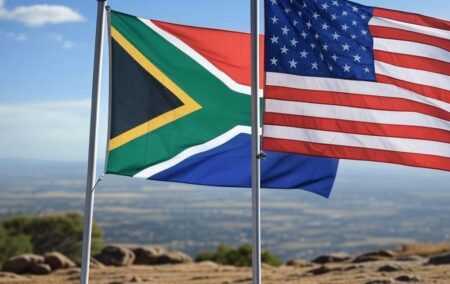The decline in relations between the US and South Africa, so vividly demonstrated in recent weeks, reflect the waning stature of South Africa globally, which is part of a broader process of the country’s decline. This is the view of Prof Theo Neethling of the University of Free State in a recent commentary posted on the website Politicsweb.
Drawing attention to academic literature on South Africa’s foreign policy, he recalled the considerable heft that the country had exercised in the Mandela and Mbeki eras, and the view of the country as wielding a force above “above its weight”, able to exercise a continental leadership role.
This was ultimately not maintained, and in 2018, a book was published by a British academic, James Hamill, entitled Africa’s Lost Leader: South Africa’s Continental Role Since Apartheid.
This argued that while South Africa had for some time been perceived as a “a credible standard-bearer for efforts in Africa to promote conflict resolution, economic development, democracy, and human rights”internal issues were increasingly working to make this unviable.
“Seven years after the publication of Africa’s Lost Leader,” Hamill wrote, “it is now crystal clear that South Africa’s global standing has taken several steps backward. In this regard, I would like to briefly highlight six aspects that have contributed to South Africa’s decline in international stature and profile.”
The six issues he focussed on are:
- Weak economic growth that have failed to keep up with its peers, while economic indicators are becoming increasingly unsustainable;
- Decreasing military capacity, which is a function of neglect and a lack of funding. This has been exposed in the effective capitulation of South African troops in the Democratic Republic of Congo;
- Setback in the G20, where South Africa’s chairing has been undermined by the failure of the US to participate, as well as the embarrassment of the state of the country’s urban governance – this has illustrated the realities of governance to major economic partners;
- Weak diplomatic capacity, which has seen the country unable to predict and adjust to changes abroad. For example, South Africa’s authorities seem to have believed that Kamala Harris would win the 2024 election and were unprepared for another Trump presidency;
- Corruption and poor governance have severely undermined the country’s global standing; and
- The ANC’s hold over foreign policy has undermined relations with its largest economic and trading economies. In alienating some of the latter, it has opened the door for non-state actors to enter the foreign policy state, as the Solidarity movement did in its foray to the US.
Neethling concluded: “It is now clear that, under the ANC’s political leadership—particularly since the Zuma administration—South Africa’s international standing has suffered significant damage. Likewise, it is evident that South Africa no longer holds the stature it did two to three decades ago when Mandela and then Mbeki were welcomed without reservation in the highest diplomatic circles worldwide. The expulsion of Ebrahim Rasool from the U.S. further underscores the ANC’s deep anti-Americanism and that South Africa has reached a turning point in its foreign relations.”

